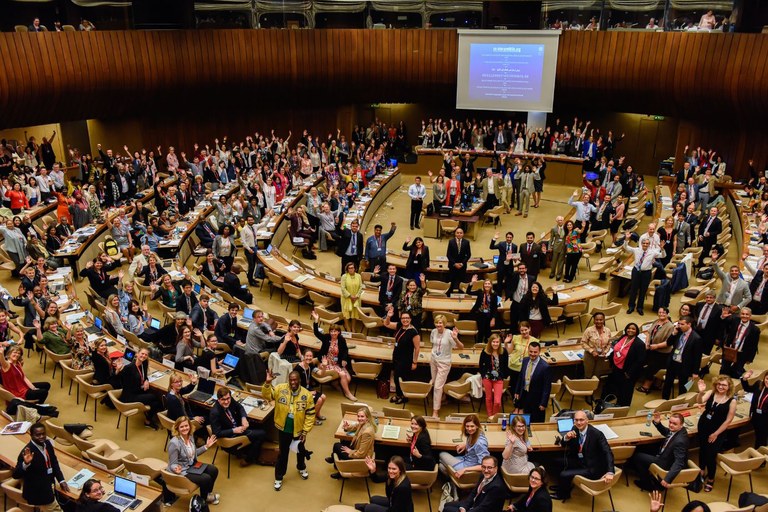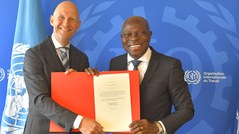Nordic trade unions praise #metoo convention
New international standards will protect everybody’s right to a world of work free from violence and harassment. Danish and other Nordic trade unions call it a great leap forward for workers globally and in the Nordic region. Danish employers doubt it will have much effect.
Sexual assaults at work and other forms of violence and harassment must not be tolerated in any kind of workplace anywhere in the world. This is the clear signal in a new convention from the UN’s International Labour Organisation, ILO. Nordic and Danish trade unions encourage Nordic countries to be the first to sign up to it.
187 of the world’s countries are ILO members. During the organisation’s annual conference in Genève in June 2019, a large majority of participating representatives from governments, employers and trade unions voted yes to the new convention, and to guidelines for how each member country can secure everyone the right to a world of work free from violence and harassment. 439 of the ILO delegates voted in favour of the new convention, with just seven voting against and 30 abstaining.
Solidarity with the domestic helper
Some have called it “the #metoo convention”, alluding to the #metoo movement against sexual harassment which began in the Hollywood film industry before spreading around much of the world. The convention will also have a global impact. It will secure better protection against violence and harassment. The Council of Nordic Trade Unions, NFS, agrees.
“The convention means a lot from a solidarity perspective. The world’s domestic helpers, street vendors and day labourers will, for instance, have their jobs acknowledged, and the convention says they should be treated with respect in a work environment free from violence and harassment,” the NFS said in a press release.
The convention says the right to a world of work free from violence and harassment includes all types of workers, irrespective of their contractual status. That means persons in training, volunteers, job seekers and individuals exercising the authority, duties or responsibilities of an employer are protected.

A lot of people have worked with the convention – here the whole committee on violence and harassment is gathered during the ILO conference. Photo: Crozet/Poteau.
The NFS and trade union movements internationally have been active and keen parties to the negotiations, which have been going on for years at the ILO in preparation for the convention. Majbrit Berlau has been one of the representatives from the Nordic negotiating team. She is the deputy head of the Danish Trade Union Confederation, which represents 1.4 million Danish workers. She calls the convention historic.
“This is the first time everyone’s right to work without facing the risk of violence and harassment has been defined as a joint international goal, and this will be hugely important. Not tomorrow, but in the long term, because we have now created a common, global framework,” says Majbrit Berlau.
Young workers face sexual harassment
In the long run, she believes the convention will provide considerably better protection for the many millions of people in the world with jobs in work environments that do not resemble Nordic ones – which enjoy regulations aimed at preventing violence and harassment at work. Yet the Nordics also have some way to go before securing a world of work completely free from violence and harassment, despite agreements and legislation regulating the Nordic labour markets. The convention is also relevant in a concrete sense, and can make a difference in the Nordic region, believes Majbrit Berlau.
“Violence and harassment is happening all the time in the Nordic labour markets, so the Nordic countries definitely need to continue to work with this.”
Young people in Nordic labour markets represent a group that is exposed to harassment, she points out. Nearly every second Danish worker aged 18 to 29 have experienced harassment at work, which makes young people the one group which is most exposed to sexual harassment according to a survey carried out for the Danish Trade Union Confederation in March 2019. This is “deeply problematic” says Berlau.
In the same survey, one in three women and one in four men said they had experienced one or more types of harassment of a sexual nature in their current or previous workplace.
The Nordics should be leading the way
Public sector employees represent another big group in need of better protection, says Majbrit Berlau.
“The public sector is a big part of the Nordic labour markets, and public sector employees are at great risk of being exposed to violence from citizens, for instance. We see an increase in the number of threatened violence against public sector workers. Nordic countries really need to work towards reducing the levels of violence and threatened violence.”
Individual countries must now decide whether to ratify the convention, which will commit them to bring their national laws into conformity with the convention. The convention will not come into effect until one year after the first two countries have ratified it. Both Nordic and Danish trade unions encourage Nordic governments to be the first to ratify the convention. Majbrit Berlau believes the Nordic countries will only need minor adjustments to their existing legislation and agreements in order to fulfil the regulations in the convention.
DA did not vote for the convention
The message from employers is somewhat different. The Confederation of Danish Employers, DA, represents 14 Danish employer organisation, with a total of 24 000 private sector member companies. It is among the minority that voted blank when the ILO convention was put to the vote in Genève.
The DA said this was because the convention uses more far-reaching language and definitions in certain areas than the confederation can sign up to – even though the DA supports the idea that everyone has the right to a world of work free for violence and harassment.
Pernille Knudsen, Deputy Director General for the DA, does not think the convention will make a difference either. In a press release, she argues that Denmark already has comprehensive employer responsibilities, a strong labour inspectorate and comprehensive legislation in this area. She thinks the convention will struggle to contribute anything to the global fight against violence and discrimination in the world of work.
Majbrit Berlau calls the DA’s message “very frustrating”.
- Majbrit Berlau
-
is deputy head of the Danish Trade Union Confederation, FH, and one of the representatives on the Nordic negotiating team in Genève.
- Update: Norway ratifies first among the Nordics
-

On 6 October 2023, Norway deposited the instrument of ratification of the Violence and Harassment Convention, 2019 (No. 190) with the Director-General of the ILO. By submitting the instrument of ratification, Norway becomes the 33rd country in the world to ratify Convention No. 190.
 Follow us on Facebook
Follow us on Facebook
